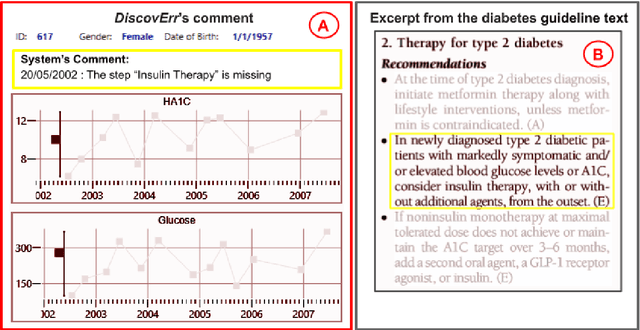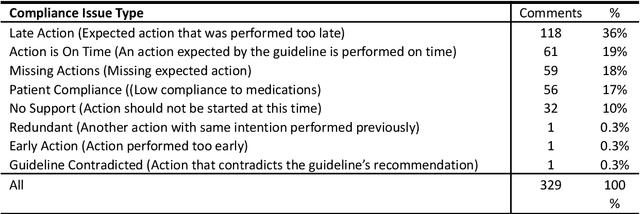Avner Hatsek
Evaluation of a Bi-Directional Methodology for Automated Assessment of Compliance to Continuous Application of Clinical Guidelines, in the Type 2 Diabetes-Management Domain
Mar 16, 2021



Abstract:We evaluated the DiscovErr system, in which we had previously implemented a new methodology for assessment of compliance to continuous application of evidence-based clinical guidelines, based on a bidirectional search from the guideline objectives to the patient's longitudinal data, and vice versa. We compared the system comments on 1584 transactions regarding the management, over a mean of 5.23 years, of 10 randomly selected Type 2 diabetes patients, to those of two diabetes experts and a senior family practitioner. After providing their own comments, the experts assessed both the correctness (precision) and the importance of each of the DiscovErr system comments. The completeness (recall or coverage) of the system was computed by comparing its comments to those made by the experts. The system made 279 comments. The experts made 181 unique comments. The completeness of the system was 91% compared to comments made by at least two experts, and 98% when compared to comments made by all three. 172 comments were evaluated by the experts for correctness and importance: All 114 medication-related comments, and a random 35% of the 165 monitoring-related comments. The system's correctness was 81% compared to comments judged as correct by both diabetes experts, and 91% compared to comments judged as correct by a diabetes expert and at least as partially correct by the other. 89% of the comments were judged as important by both diabetes experts, 8% were judged as important by one expert, 3% were judged as less important by both experts. The completeness scores of the three experts (compared to the comments of all experts plus the validated system comments) were 75%, 60%, and 55%; the experts' correctness scores (compared to their majority) were respectively 99%, 91%, and 88%. Conclusion: Systems such as DiscovErr can assess the quality of continuous guideline-based care.
A Methodology for Bi-Directional Knowledge-Based Assessment of Compliance to Continuous Application of Clinical Guidelines
Mar 13, 2021



Abstract:Clinicians often do not sufficiently adhere to evidence-based clinical guidelines in a manner sensitive to the context of each patient. It is important to detect such deviations, typically including redundant or missing actions, even when the detection is performed retrospectively, so as to inform both the attending clinician and policy makers. Furthermore, it would be beneficial to detect such deviations in a manner proportional to the level of the deviation, and not to simply use arbitrary cut-off values. In this study, we introduce a new approach for automated guideline-based quality assessment of the care process, the bidirectional knowledge-based assessment of compliance (BiKBAC) method. Our BiKBAC methodology assesses the degree of compliance when applying clinical guidelines, with respect to multiple different aspects of the guideline (e.g., the guideline's process and outcome objectives). The assessment is performed through a highly detailed, automated quality-assessment retrospective analysis, which compares a formal representation of the guideline and of its process and outcome intentions (we use the Asbru language for that purpose) with the longitudinal electronic medical record of its continuous application over a significant time period, using both a top-down and a bottom-up approach, which we explain in detail. Partial matches of the data to the process and to the outcome objectives are resolved using fuzzy temporal logic. We also introduce the DiscovErr system, which implements the BiKBAC approach, and present its detailed architecture. The DiscovErr system was evaluated in a separate study in the type 2 diabetes management domain, by comparing its performance to a panel of three clinicians, with highly encouraging results with respect to the completeness and correctness of its comments.
 Add to Chrome
Add to Chrome Add to Firefox
Add to Firefox Add to Edge
Add to Edge